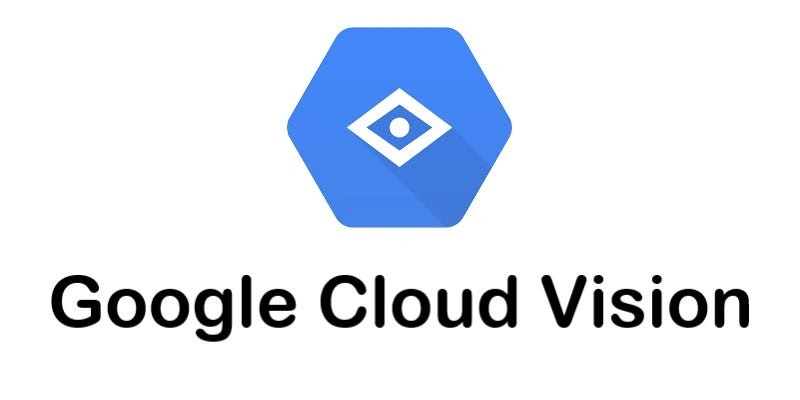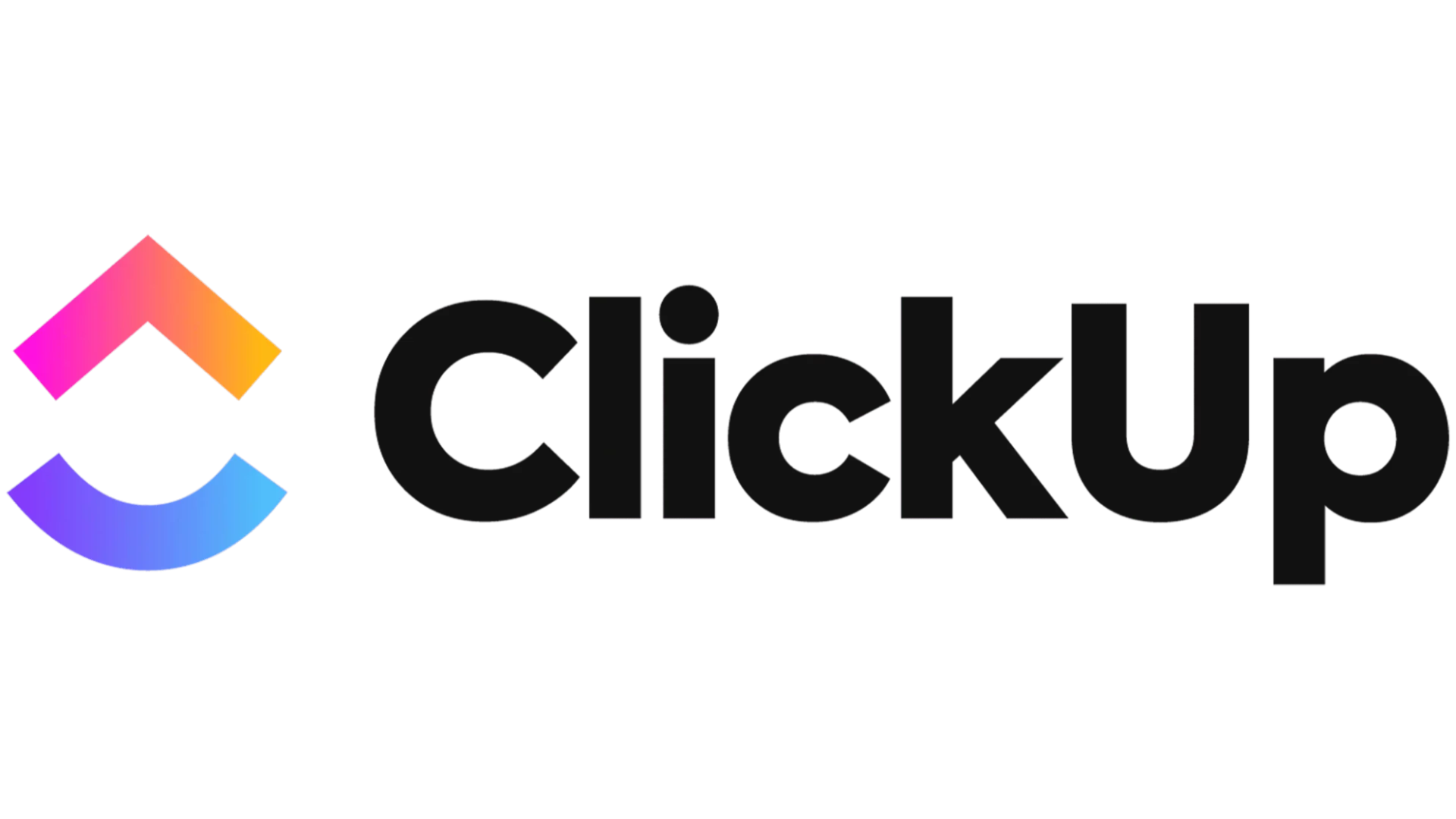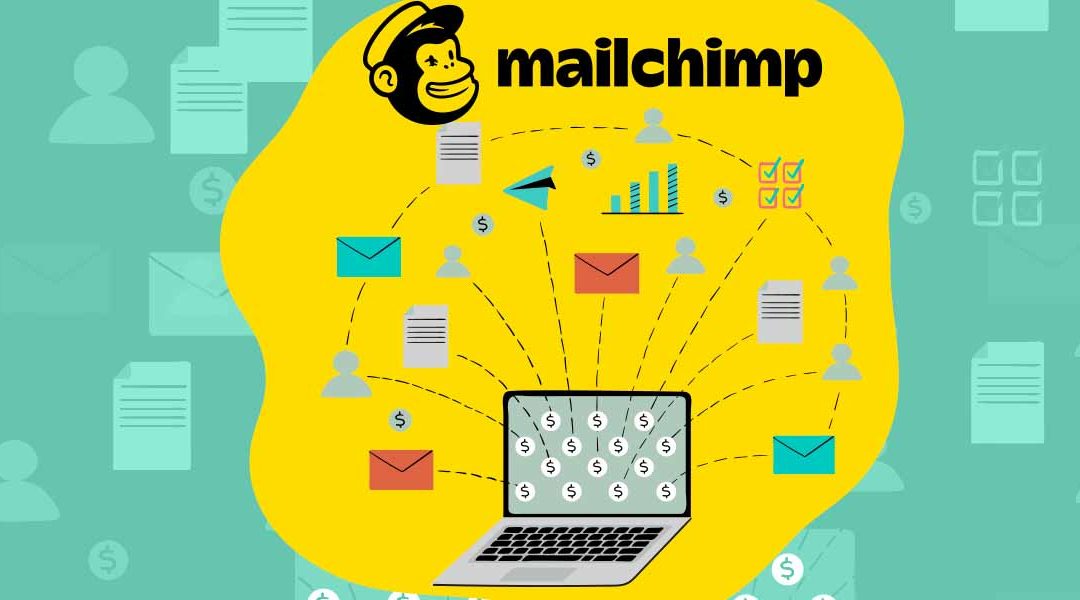Top 21 Marketing Automation tools for 2024
Table of Content
In today’s digital whirlwind, automation is no longer a luxury – it’s essential. Businesses of all sizes are embracing marketing automation tools to streamline workflows and achieve growth.
But with so many options available, how do you choose the right one?
This article cuts through the noise to help you find the perfect marketing automation tool for 2024
From email marketing powerhouses to platforms with robust CRM and e-commerce features, we’ve curated a list of the top 21 marketing automation tools for 2024
How to Choose the Best Tool for Your Needs
Choosing the right marketing automation tool goes beyond just features. Usability is key–your team needs to adopt it easily. Look for seamless integration with your existing marketing stack to avoid data silos. Finally, consider scalability–the platform should grow with your business, and strong customer support ensures smooth sailing when you encounter bumps in the road.
Marketing automation can revolutionize your marketing efforts, but picking the right tool is key. Here’s your 7-step guide:
1. Understand your needs
A user-friendly platform is essential. Avoid overly complex interfaces – choose one that’s intuitive and doesn’t require coding skills.
2. Focus on features
Explore the features offered by different platforms. Prioritize based on your needs. Need robust email marketing? Look for strong email capabilities.
3. Ease of Use
Identify your goals (lead gen, engagement, sales?). Choose a platform that aligns with your specific objectives.
4. Integration with other services
Solid analytics and reporting are crucial. Track campaign performance, understand customer behavior, and optimize your strategy with data-driven insights.
5. Reporting and Analytics
Explore features, assess usability, and get a feel for customer support before committing. Take advantage of free trials or demos offered by most marketing automation tools.
6. Demos and Free Trials
Ensure the marketing automation software integrates seamlessly with your existing tools (CRM, CMS) for a unified marketing ecosystem.
7. Accessible Customer Support
Even the best platforms need help sometimes. Choose a provider with reliable customer support options like live chat, phone support, or a comprehensive knowledge base.
With this checklist, you’ll be well-equipped to choose the marketing automation platform that empowers your team and propels your marketing efforts to new heights!
Top Marketing Automation Tools for Businesses on the Rise
1. HubSpot
HubSpot’s marketing automation platform stands out for its user-friendly visual interface, allowing you to create powerful automated workflows with ease.
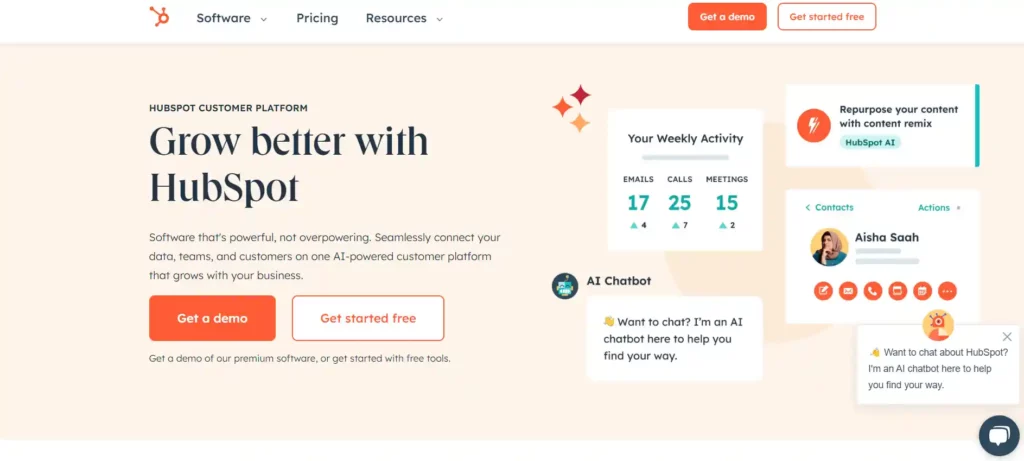
Key Features
- Automated Email Drip Campaigns: Nurture leads and keeps customers engaged with a series of automated emails.
- Personalized Workflows: Tailor your marketing efforts to individual customers for a more relevant experience.
- Lead Scoring: Prioritize leads based on their engagement and likelihood to convert, helping your sales team focus on the most promising opportunities.
- Robust Analytics: Track your marketing campaign performance and gain valuable insights to optimize your strategy.
Pros
- Increased Efficiency: Automate repetitive tasks and free up your team’s time.
- Personalized Marketing: Deliver targeted messaging that resonates with your audience.
- Data-Driven Decisions: Make informed choices based on in-depth analytics.
Cons
- Cost: Marketing automation tools can be expensive, especially for smaller businesses.
- Complexity: While user-friendly interfaces are becoming more common, some platforms can have a learning curve.
2. Active Campaign
ActiveCampaign shines as a marketing automation tool. It simplifies both basic and advanced automation tasks, offering features like automated follow-ups, seamless integrations with other tools, and powerful contact segmentation.
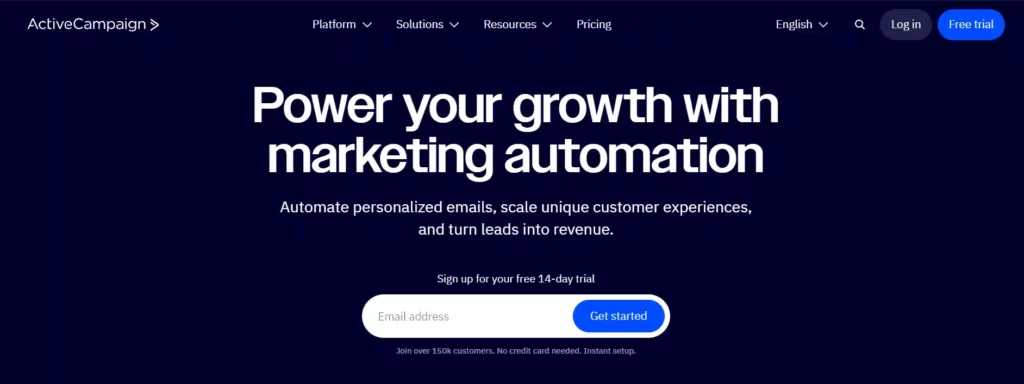
Key Features
- Effortless Social Scheduling: Manage your social media presence across multiple platforms from a single hub. Schedule posts in advance and track their performance.
- Retargeting Power: Reconnect with website visitors through targeted ads, keeping your brand top-of-mind and driving conversions.
- Visualize the Customer Journey: Map out your customer’s interaction with your brand, identifying touchpoints for optimization and a more seamless experience.
- A/B Testing Champion: Fine-tune your campaigns with A/B testing, ensuring you deliver the most impactful content and maximize results.
Pros
- Email Marketing Hero: ActiveCampaign excels in email marketing, offering robust features and customization options.
- Segmentation Savvy: Slice and dice your audience with powerful segmentation tools to personalize your marketing efforts.
- Integration All-Star: Connect Active Campaign seamlessly with your favorite business tools for a unified marketing ecosystem.
Cons
- Learning Curve: While user-friendly, some users find the platform’s initial navigation a bit complex, especially if new to marketing automation.
3. MailChimp
Mailchimp has transcended its email marketing roots to become a comprehensive marketing automation platform. Businesses of all sizes leverage its user-friendly interface and vast template library to craft engaging email campaigns.
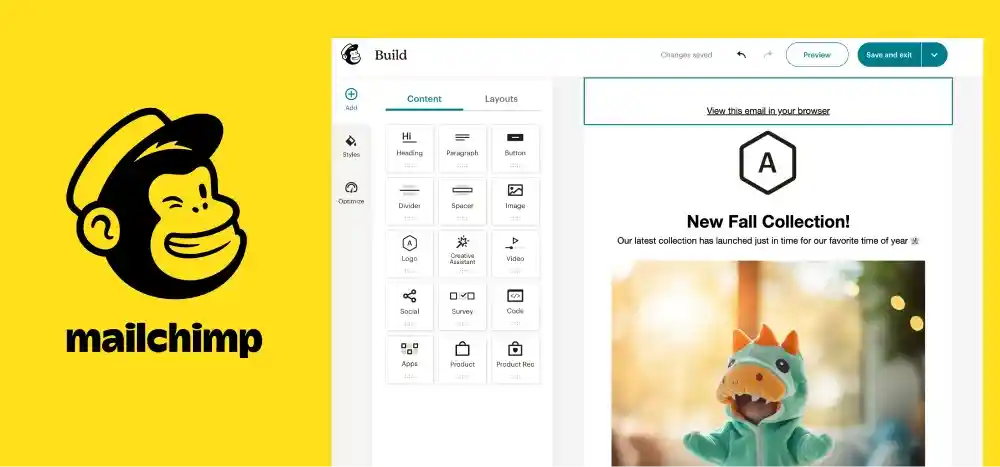
Key Features
- Marketing Automation: Automate workflows for nurturing leads and boosting engagement.
- Marketing Calendar: Visually plan and track your marketing activities across various channels.
- Multi-Channel Marketing: Manage email, landing pages, social media ads, and more from a single platform.
- Search Marketing: Optimize your website content to improve search engine visibility.
- Social Marketing: Schedule and manage social media posts for a more streamlined social media presence
Pros
- User-friendly interface makes it easy to get started, especially for beginners.
- Extensive email marketing features and templates.
- Free plan available, ideal for small businesses or those starting out.
Cons
- Some users find the platform less intuitive as it’s grown more comprehensive.
- Occasional customer support critiques have been reported.
4. Omnisend
Omnisend empowers e-commerce businesses to streamline marketing with powerful automation. Create multi-channel campaigns across email, SMS, and more, all from one platform.
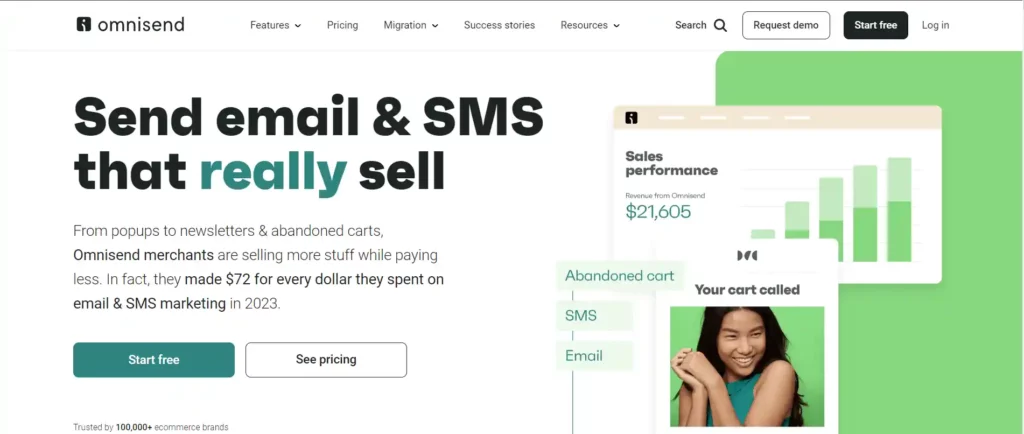
Key Features
- Effortless Automation: Pre-built workflows for common tasks like abandoned cart recovery, welcome series, and transaction emails save you time and effort.
- Targeted Audience Segmentation: Reach the right customers with the right message by creating laser-focused audience segments.
- Seamless Integrations: Omnisend integrates seamlessly with popular e-commerce platforms like Shopify and WooCommerce.
Pros
- User-friendly interface makes automation a breeze, even for beginners.
- Strong email and SMS marketing capabilities for comprehensive customer engagement.
- Integrations streamline marketing efforts and data flow.
Cons
- Some users report limitations in the reporting features, desiring more advanced analytics.
5. GetResponse
GetResponse goes beyond email marketing. It’s a comprehensive marketing automation platform designed to nurture leads and convert them into loyal customers.
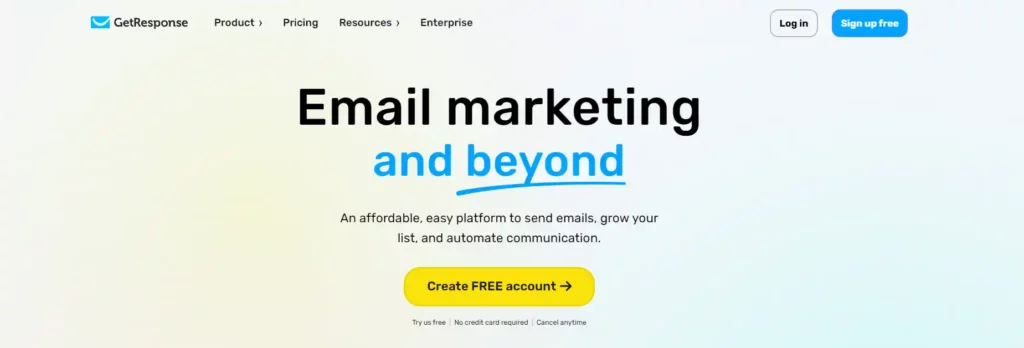
Key Features
- Effortless Email Creation: Design beautiful and engaging emails with the user-friendly drag-and-drop editor.
- Landing Pages for Conversion: Craft high-converting landing pages to capture leads and grow your audience.
- Webinars Made Easy: Host engaging webinars directly within the platform to connect with your audience.
- Automated Workflows: Trigger targeted email campaigns based on user behavior for personalized engagement.
- Advanced Segmentation: Reach the right audience with the right message by creating laser-focused segments based on various criteria.
Pros
- All-in-one platform: Manage email marketing, landing pages, webinars, and automation from a single hub.
- Streamlined workflows: Automate tasks and save time with powerful marketing automation features.
Cons
- Reporting limitations: Some users find the reporting features could be more comprehensive.
- Pricing considerations: GetResponse pricing can be higher than some competitors.
6. Ontraport
Ontraport is the dream solution for businesses seeking a unified marketing and sales platform. It seamlessly blends advanced marketing automation with a robust CRM, giving you complete control over your customer lifecycle.
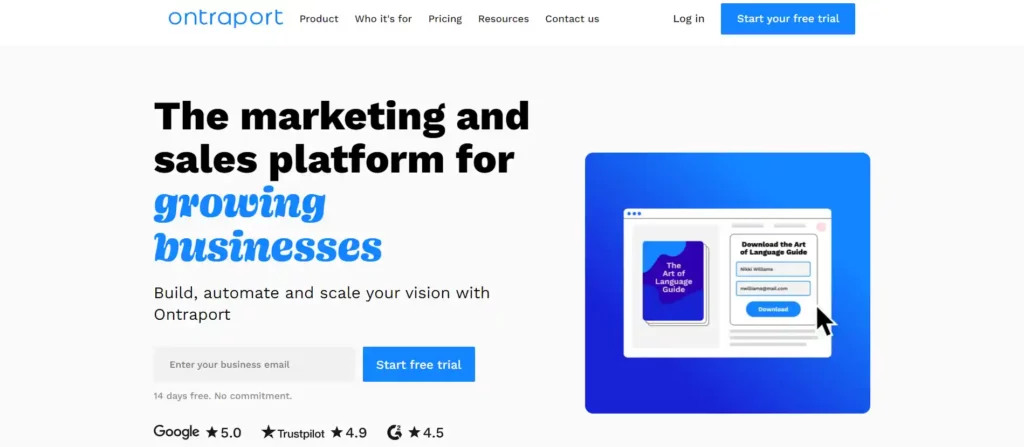
Key Features
- Automated Workflows: Simplify your marketing efforts by automating repetitive tasks and nurturing leads.
- Data-Driven Decisions: Gain valuable insights from comprehensive customer data and reporting tools.
- Email Marketing Made Easy: Design and send targeted email campaigns to engage your audience.
- Landing Page Creation: Craft high-converting landing pages to capture leads and grow your audience.
Pros
- Unified platform: Manage marketing automation, CRM, and e-commerce (optional) functionalities in one place.
- Advanced features: Powerful marketing automation and comprehensive reporting capabilities.
Cons
- Learning curve: The user interface may require some adaptation for those new to marketing automation tools.
- Potential for less intuitive navigation: Some users might find the interface less intuitive compared to other platforms.
7. Salesmate
Salesmate goes beyond a simple CRM. It’s a powerful platform that empowers sales teams to close more deals and drive revenue.
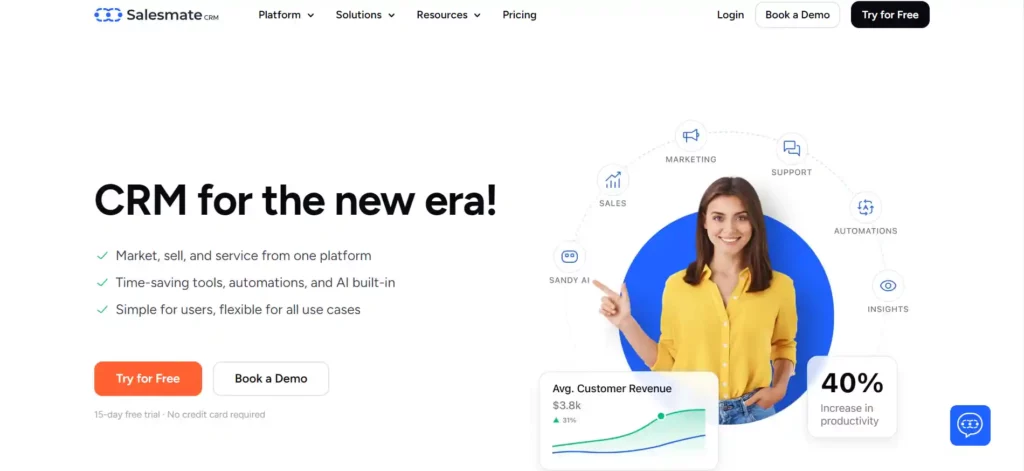
Key Features
- Automated Processes: Automate repetitive tasks like email sequences and lead nurturing to free up your team’s time.
- Intuitive Interface: Salesmate is easy to learn and use, making it ideal for teams of all sizes.
- Comprehensive Toolkit: Manage every step of the sales process with features like contact management, built-in calling, web forms, and sales reports.
Pros
- All-in-one solution: Manage CRM, marketing automation, and sales tasks in one centralized platform.
- Competitive pricing: Offers a high return on investment for small businesses, especially with its transparent pricing structure.
- Excellent customer support: Get the help you need with readily available customer service.
Cons
- Learning curve for advanced features: Some advanced features may require some initial familiarization.
8. Marketo
Marketo Engage by Adobe is a top-tier marketing automation platform designed to scale alongside ambitious businesses. It offers a robust suite of automation features to streamline your marketing efforts, nurture leads, and drive growth.
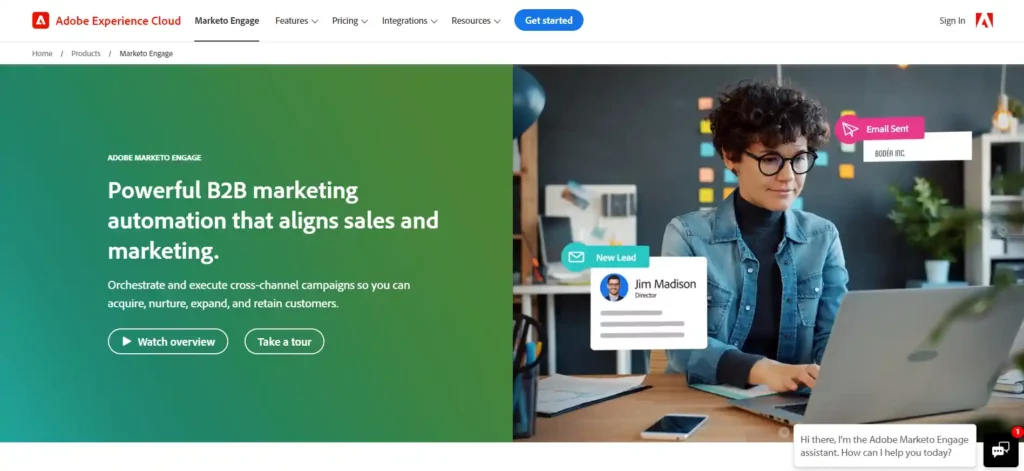
Key Features
- A/B Testing: Optimize your campaigns for maximum impact with split testing functionality.
- Lead Nurturing & Scoring: Engage leads with targeted campaigns and prioritize high-potential opportunities with lead scoring.
- Deep Analytics: Gain actionable insights from comprehensive analytics to measure campaign performance and make data-driven decisions.
Pros
- Scalability for Growth: Marketo Engage adapts to your needs as your business expands.
- Advanced Features: Unleash the power of A/B testing, lead scoring, and in-depth analytics for peak marketing performance.
Cons
- Complexity for Beginners: The extensive features might require a steeper learning curve for smaller businesses.
- Premium Price Point: Marketo Engage caters to established businesses and comes with a higher price tag (no free plan or trial available).
9. EngageBay
EngageBay empowers small businesses to streamline workflows and unlock growth potential. This comprehensive platform combines marketing automation, sales, and customer service tools in one user-friendly interface.
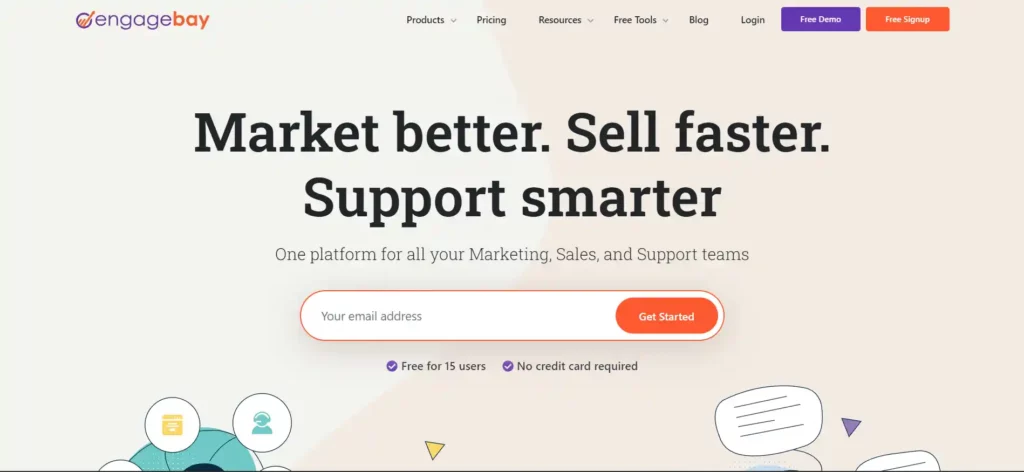
Key Features
- Automated Workflows: Eliminate repetitive tasks by automating email and SMS campaigns, lead scoring, and more.
- Smart Segmentation: Deliver targeted messaging to specific customer segments for higher engagement.
- Personalized Emails: Craft personalized email experiences that resonate with your audience.
Pros
- All-in-one solution: Manage marketing, sales, and customer service from a single platform, streamlining workflows.
- Competitive pricing: Offers an affordable option for small businesses looking for a comprehensive solution.
Cons
- Occasional system glitches: Some users have reported minor technical issues.
- Room for customer support improvement: Customer support could be more comprehensive.
10. BIGContacts
BIGContacts is a user-friendly all-in-one solution for businesses of all sizes and industries. It combines powerful CRM functionalities with marketing automation tools to manage your customer relationships and marketing efforts effectively.
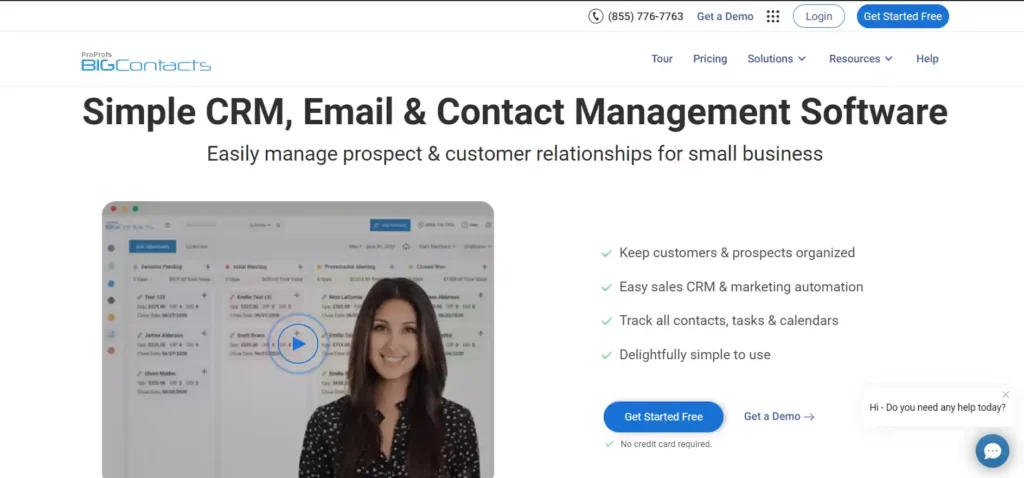
Key Features
- Centralized Contact Management: Store and manage all your customer data in one place, fostering better organization.
- Streamlined Email Marketing: Create, send, and track email campaigns directly within the platform.
- Exceptional Customer Support: Get the help you need with BIGContacts’ renowned customer service team.
Pros
- Easy to Use: The user-friendly interface makes BIGContacts accessible for businesses of all technical backgrounds.
- Comprehensive CRM & Automation: Manage both customer relationships and marketing automation tasks within a single platform.
- Stellar Customer Service: BIGContacts is known for its excellent customer support.
Cons
- Interface Modernization: Some users might prefer a more modern and visually appealing interface.
- Email Marketing Limitations: While robust, BIGContacts’ email marketing features might be less comprehensive compared to dedicated email marketing platforms.
11. SharpSpring
SharpSpring cuts through the complexity of marketing automation, offering a powerful and user-friendly platform for businesses of all sizes. Focus on what matters most – boosting conversions and delivering exceptional customer experiences.
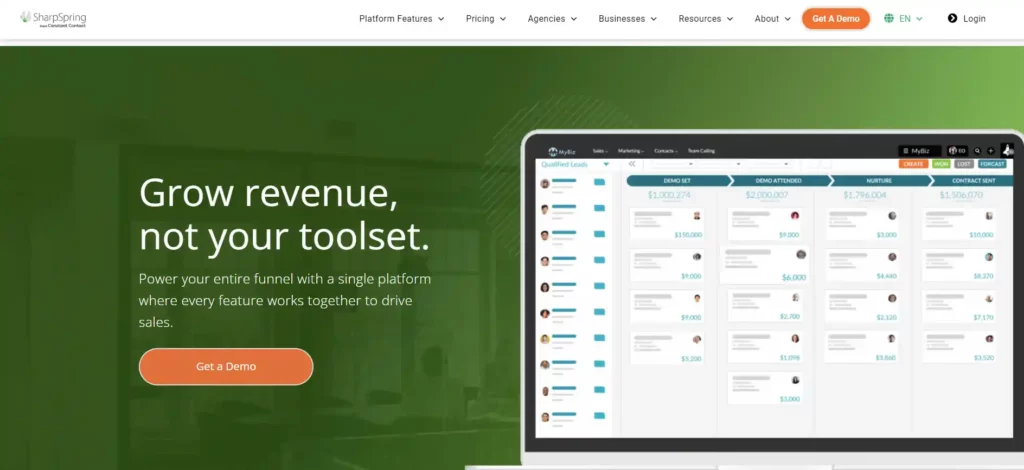
Key Features
- Automated Workflows: Craft personalized email campaigns and nurture leads with SharpSpring’s intuitive workflow builder.
- Behavioral Targeting: Deliver relevant messages based on customer behavior with the power of behavioral-based email marketing.
- In-Depth Analytics: Gain valuable insights from website visitor tracking and comprehensive analytics to optimize your marketing efforts.
Pros
- Feature-Rich Platform: Offers a comprehensive set of marketing automation tools to streamline your sales and marketing processes.
- Integration Powerhouse: SharpSpring seamlessly integrates with various marketing tools, making it ideal for complex marketing ecosystems.
- Agency-Friendly: SharpSpring caters to marketing agencies managing multiple clients with efficient client management features.
Cons
- Initial Setup Learning Curve: Some users might find the initial setup process less intuitive.
- Interface Improvement Potential: The user interface could benefit from a touch of simplification for enhanced user experience
12. User.com
User.com empowers businesses of all sizes with powerful marketing automation. Streamline your entire marketing process and boost conversions by engaging with leads and clients effectively.
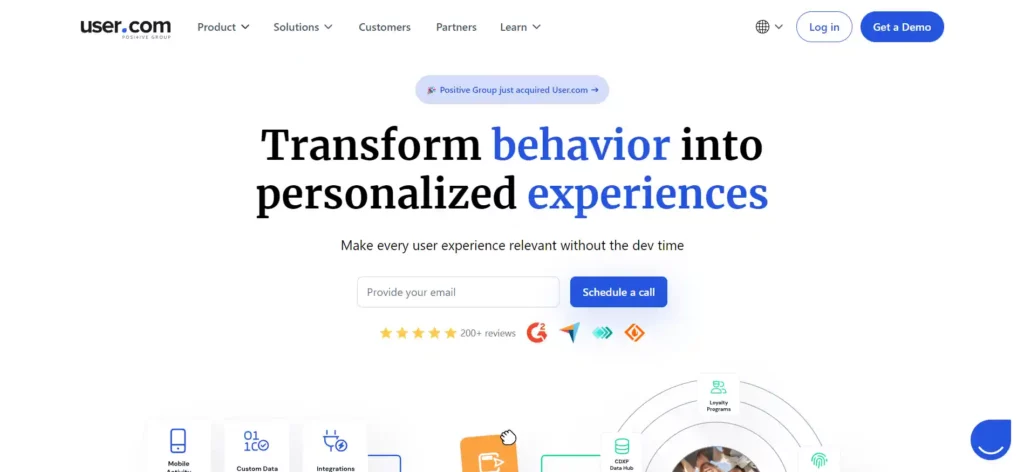
Key Features
- Effortless Email Marketing: Create and send targeted email campaigns to nurture leads and drive results.
- Visitor Tracking & Live Chat: Gain valuable insights from visitor behavior and engage with prospects in real-time through live chat.
- Smart Automation: Simplify your workflow with automated campaigns triggered by user behavior.
- Powerful Analytics: Track performance and make data-driven decisions with comprehensive analytics.
Pros
- All-in-one Platform: Manage all your marketing automation needs – email, live chat, lead nurturing, and analytics – in one centralized hub.
- User-Friendly Interface: User.com is known for its intuitive interface and easy customization options.
- Scalable Solution: Whether you’re a small business or a large enterprise, User.com scales to fit your needs.
Cons
- Potential Performance Issues: Some users have reported occasional slowness within the platform.
- Learning Curve for Beginners: The wide range of features may require some initial exploration for new users
13. Autopilot
Autopilot puts the power of visual marketing automation in your hands. Design and automate seamless customer journeys, fostering deeper engagement with your audience.
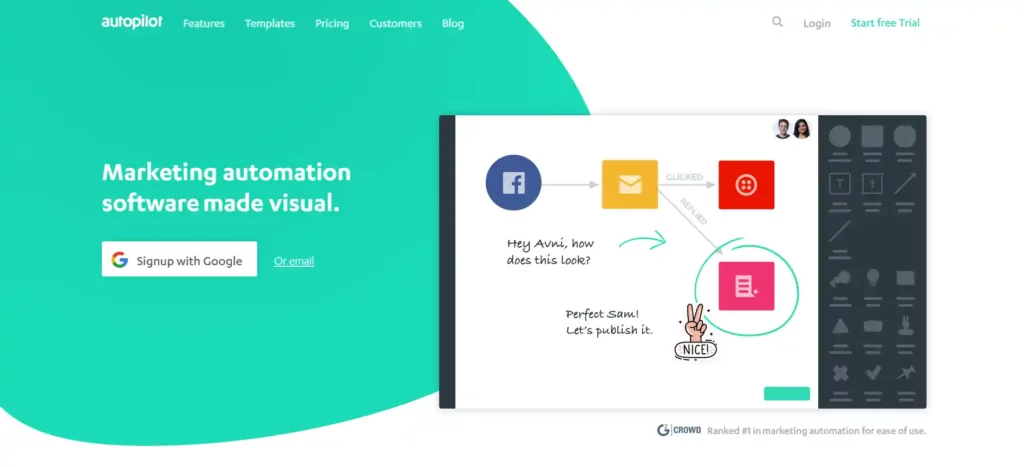
Key Features
- Visual Workflows: Craft clear and engaging customer journeys with Autopilot’s intuitive visual interface.
- Advanced Automation: Automate key touchpoints throughout the customer journey, streamlining your marketing efforts.
- Real-Time Collaboration: Work together with your team to refine and optimize your customer journeys.
Pros
- Visual Customer Journeys: Intuitive drag-and-drop interface makes building and visualizing customer journeys effortless.
- Automation Powerhouse: Automate key marketing actions throughout the customer journey, saving you time and resources.
- Integration Flexibility: Seamlessly integrate Autopilot with your existing marketing tools.
Cons
- Learning Curve: Some users report a steeper learning curve compared to other marketing automation platforms.
- Limited Analytics: Users have requested more advanced analytics features for deeper campaign insights.
14. Moosend
Moosend empowers businesses to craft personalized marketing campaigns that resonate. This user-friendly platform combines robust email marketing automation with a drag-and-drop editor and a vast template library.
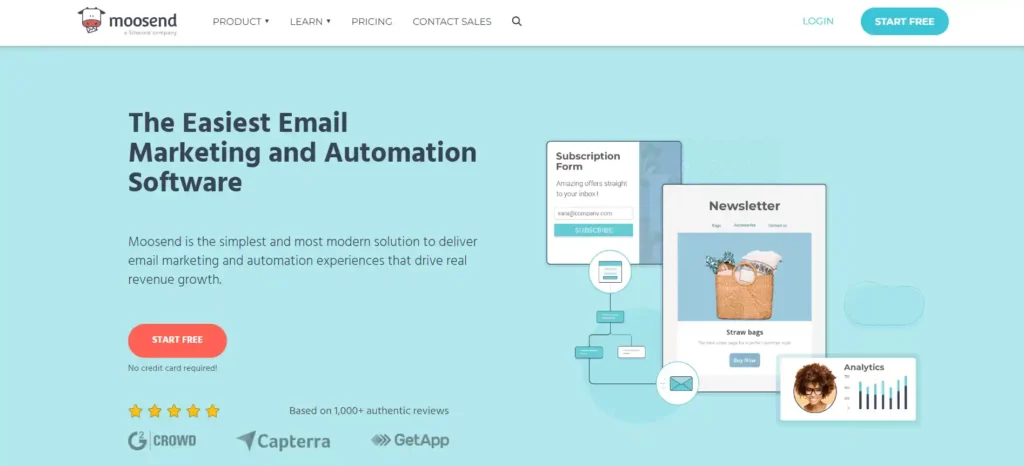
Key Features
- Effortless Email Creation: Design beautiful and engaging emails with the intuitive drag-and-drop editor.
- Automated Workflows: Personalize customer journeys and trigger targeted messages based on user behavior.
- Real-Time Insights: Gain valuable data from comprehensive analytics to optimize your marketing efforts
Pros
- Personalized Communication: Moosend empowers you to create targeted email campaigns that resonate with your audience.
- Drag-and-Drop Simplicity: Effortlessly design professional emails with a user-friendly editor and extensive template library.
- Actionable Analytics: Make data-driven decisions with real-time insights from Moosend’s powerful analytics.
Cons
- Maturity in Features: While feature-rich, Moosend might lack some advanced functionalities offered by more established marketing automation platforms.
- Room for Customer Support Improvement: Some users have reported areas for improvement in customer support.
15. Circleboom Publish
Circleboom Publish, a user-friendly platform lets you schedule, publish, and manage posts across major platforms like Twitter, Instagram, Facebook, and more.
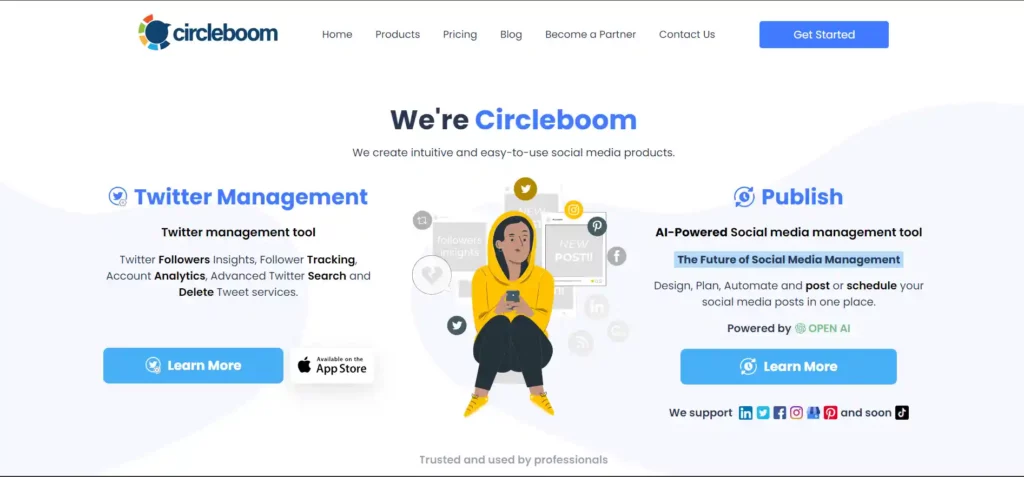
Key Features
- Automated Scheduling: Save time by scheduling social media posts in advance for a consistent online presence.
- Multi-Platform Management: Manage all your social media accounts from one central hub, simplifying your workflow.
- Content Calendar: Visually plan and track your social media strategy with an intuitive calendar view.
- Performance Insights: Gain valuable data from Circleboom Publish’s analytics to measure social media success and optimize your strategy.
Pros
- Social Media Powerhouse: Circleboom Publish excels in managing social media scheduling, publishing, and analytics for multiple platforms.
- Easy-to-Use Interface: The intuitive interface makes it simple to navigate and manage your social media presence.
- Multi-Account Management: Effortlessly manage multiple social media accounts from a single platform.
Cons
- Focused Functionality: Circleboom Publish excels in social media management but may have limitations in broader marketing automation compared to all-in-one platforms.
- Analytics Granularity: Some users might desire more in-depth analytics and reporting capabilities.
16. Pardot
Pardot by Salesforce stands out as a powerful marketing automation solution specifically designed for B2B businesses. It fosters seamless collaboration between marketing and sales teams.
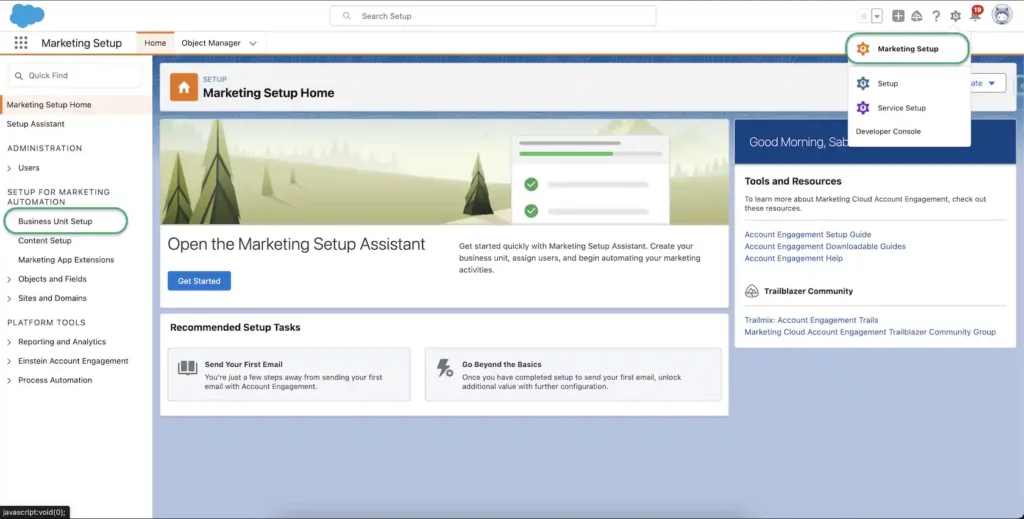
Key Features
- Engage Buyers: Nurture leads with targeted campaigns and personalized email marketing.
- Close More Deals: Streamline the sales process with lead scoring and insightful buyer behavior tracking.
- Build Lasting Relationships: Cultivate strong customer relationships through effective engagement strategies.
- Seamless Salesforce Integration: Pardot integrates flawlessly with Salesforce CRM, creating a unified platform for managing customer interactions.
- Robust Marketing Features: Benefit from a comprehensive suite of B2B marketing tools like campaign management, lead scoring, and detailed analytics.
Pros
- B2B Focus: Pardot’s features are specifically tailored to B2B marketing needs, providing targeted functionalities.
- Salesforce Integration: The seamless integration with Salesforce CRM creates a unified customer data platform.
Cons
- Cost Consideration: Pardot’s pricing structure may be less accessible for small businesses.
- Limited Social Media Tools: Pardot has limited social media capabilities compared to broader marketing automation platforms
17. Flipsnack
Flipsnack empowers businesses to go beyond static PDFs. This user-friendly platform lets you design professional and interactive online magazines, brochures, catalogs, and more.
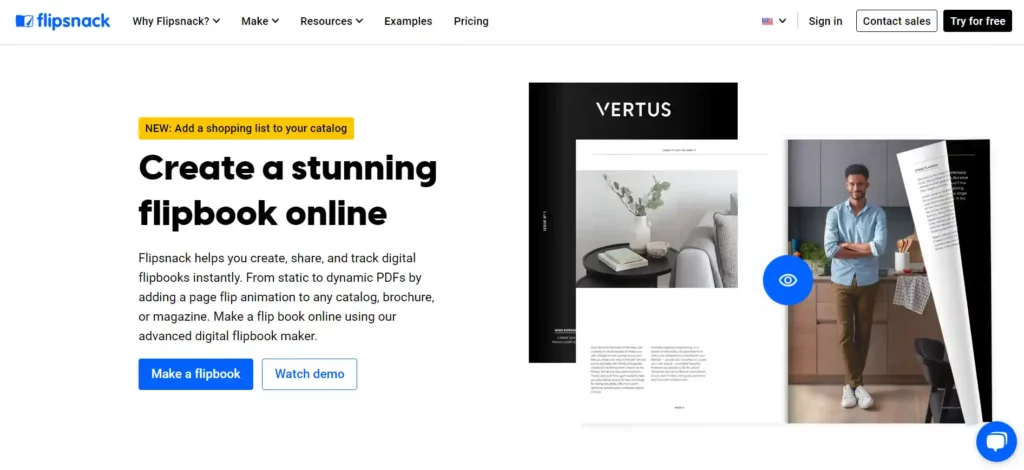
Key Features
- Drag-and-Drop Design: Effortlessly create stunning digital publications with the intuitive drag-and-drop interface.
- Interactive Features: Boost engagement with multimedia elements like videos, animations, and hyperlinks.
- Scheduled Publishing: Schedule your publications to go live automatically for a seamless workflow.
- Social Media Sharing: Automatically share your content across social media platforms to reach a wider audience.
Pros
- Engaging Digital Content: Create visually appealing and interactive content that grabs attention and drives results.
- User-Friendly Design: Flipsnack makes it easy for anyone to create professional-looking digital publications.
- Automated Features: Schedule publishing and social media sharing to save time and streamline your workflow.
Cons
- Niche Focus: Flipsnack is primarily a digital publishing tool, so it might not address all marketing automation needs.
- Pricing Considerations: Some users consider the pricing to be high compared to the offered features.
18. Oracle Eloqua
Oracle Eloqua empowers large B2B enterprises to scale their marketing efforts effortlessly. This comprehensive marketing automation platform streamlines cross-channel campaigns, nurtures leads through every stage of the buyer’s journey, and fosters seamless sales and marketing alignment.
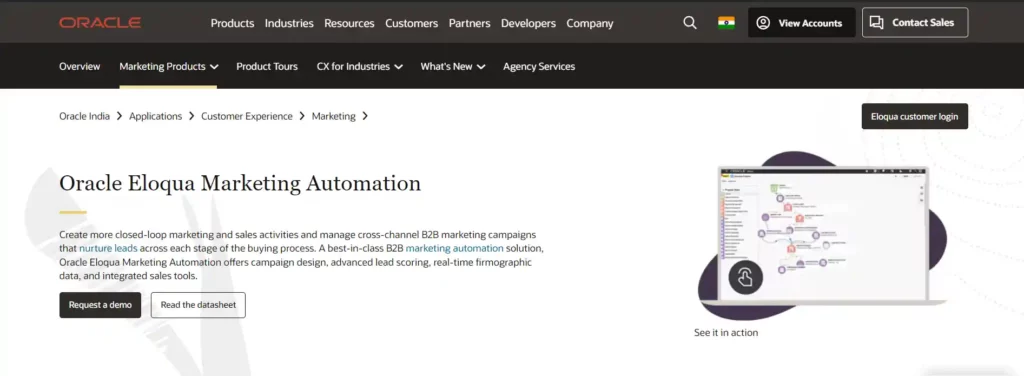
Key Features
- Advanced Intelligence: Leverage sophisticated lead scoring, segmentation, and marketing attribution to gain deep customer insights.
- Scalable & Robust: Eloqua adapts to your growing marketing needs, ensuring optimal performance for large organizations.
- Seamless Integrations: Eloqua integrates seamlessly with other Oracle products, creating a unified business ecosystem.
Pros
- Enterprise-Grade Solution: Built to handle complex marketing needs of large B2B businesses.
- In-Depth Analytics & Segmentation: Gain valuable customer insights with advanced analytics and precise audience segmentation capabilities.
- Strong Integrations: Eloqua integrates effortlessly with other Oracle products for a unified user experience.
Cons
- Learning Curve & Complexity: Eloqua’s extensive features require a steeper learning curve compared to simpler marketing automation tools.
- Limited Accessibility: The high cost and custom pricing structure might not be suitable for small businesses or those with more specific needs.
19. SendX
SendX makes marketing automation accessible and affordable for businesses of all sizes. This user-friendly platform offers a robust toolkit.
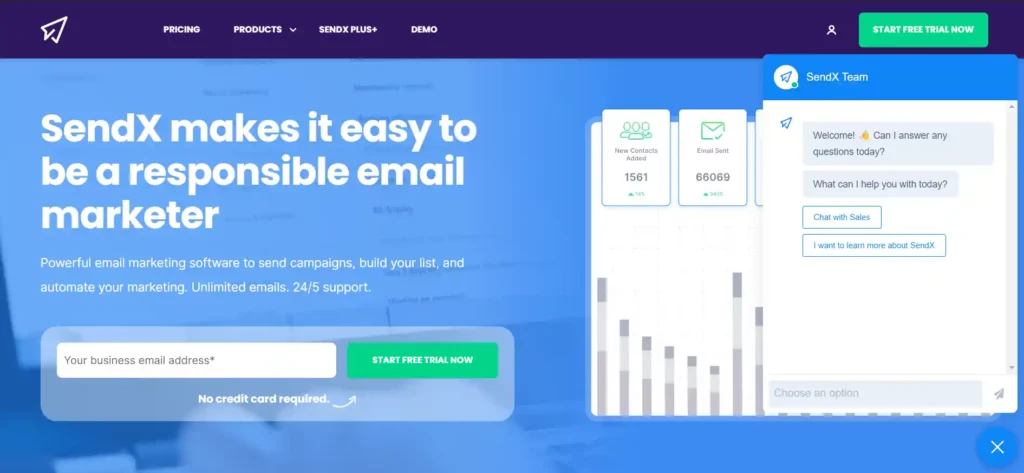
Key Features
- Effortless Email Marketing: Create and send targeted email campaigns with ease.
- Lead Generation: Capture leads with effective signup forms and nurture them with automated drip sequences.
- Actionable Insights: Gain valuable data from detailed analytics and reporting to optimize your marketing efforts
Pros
- Easy to Use: SendX boasts an intuitive interface, making it simple for anyone to create and manage email marketing campaigns.
- Cost-Effective Choice: SendX offers a comprehensive feature set at a competitive price, ideal for businesses on a budget.
Cons
- Limited Integrations: While SendX offers some integrations, it might not connect with all the business tools you use.
- Basic Automation: The automation features are functional but lack the advanced customization options found in more complex platforms.
20. Drip
Drip is your one-stop shop for personalized e-commerce marketing automation. This platform goes beyond email marketing.
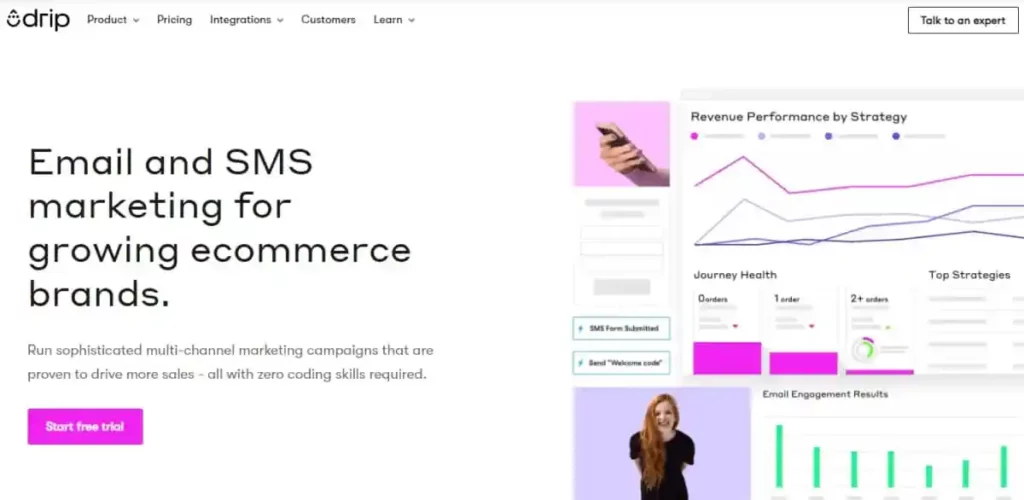
Key Features
- Craft Engaging Customer Journeys: Visually map out automated email sequences that nurture leads and drive sales.
- Personalize Every Touchpoint: Deliver relevant and engaging experiences across multiple channels, like email and SMS.
- Actionable Insights: Gain valuable data from detailed analytics to optimize your marketing efforts and maximize ROI.
- Seamless Integrations: Drip integrates effortlessly with popular e-commerce platforms and marketing tools, streamlining your workflow.
- Advanced Automation: Automate key marketing tasks and personalize customer journeys for a frictionless buying experience
Pros
- E-commerce Focused: Tailored features cater specifically to the needs of e-commerce businesses.
- Personalization Powerhouse: Deliver targeted messaging and experiences across multiple channels.
- Streamlined Integrations: Effortlessly connect Drip with your existing e-commerce and marketing tools.
Cons
- Template Improvement Potential: Some users would like a more user-friendly and adaptable email template builder.
- Pricing Considerations: Drip’s pricing can be higher compared to other options, especially for businesses with large email lists.
21. Hootsuite
Hootsuite is a popular social media management platform that empowers businesses to streamline their social media presence. It goes beyond scheduling posts and dives into social listening, team collaboration, and even basic marketing automation.
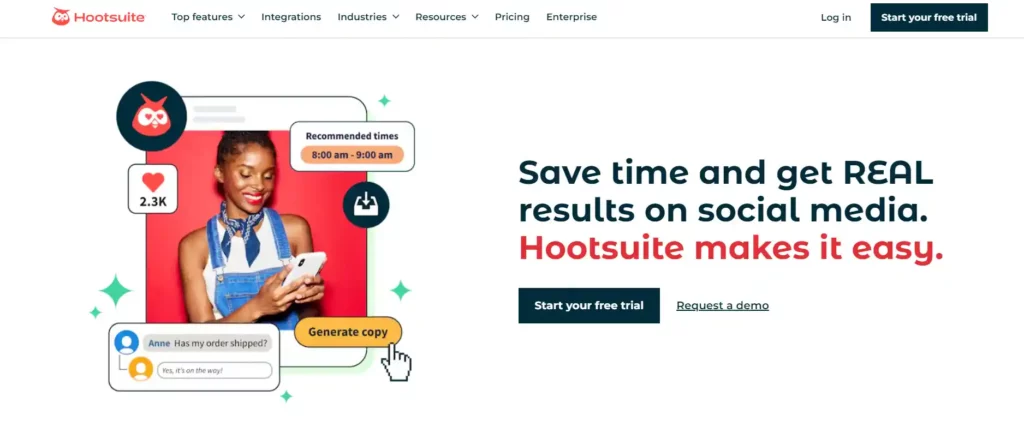
Key Features
- Schedule and Publish: Plan your social media content calendar in advance and publish seamlessly across various platforms like Facebook, Twitter, Instagram, LinkedIn, and more.
- Social Listening: Track brand mentions, industry trends, and competitor activity to stay informed and adapt your strategies.
- Team Collaboration: Assign tasks, manage approvals, and collaborate with your team efficiently within the Hootsuite platform.
- Analytics and Reporting: Gain valuable insights into your social media performance with detailed reports on engagement, reach, and conversions.
- Basic Automation: Utilize Hootsuite’s automation features to automatically respond to direct messages, schedule recurring posts, and manage social media crises.
Pros
- User-friendly interface: Hootsuite is known for its intuitive design, making it easy for beginners to navigate.
- Multi-platform management: Manage all your social media accounts from one central location.
- Social listening capabilities: Gain valuable insights from social media conversations.
- Team collaboration tools: Facilitate seamless collaboration within your marketing team.
- Free plan available: Hootsuite offers a limited free plan to test the waters.
Cons
- Limited automation features: While offering basic automation, Hootsuite may not be ideal for businesses seeking advanced marketing automation functionalities.
- Pricing scales with features: As your needs grow and you require more advanced features like advanced analytics or social listening, the price can increase significantly.
- Limited free plan: The free plan offers basic functionalities with significant limitations.
Conclusion
This guide empowers you to pick the perfect marketing automation tool for your needs and budget. Focus on your goals (deep customer insights? smooth campaigns?) and explore free trials to find your ideal fit. The future of marketing is automated, personalized, and data-driven. Don’t forget to consider Robylon AI, an emerging platform offering innovative solutions alongside established players. Choose wisely, and watch your marketing soar!


